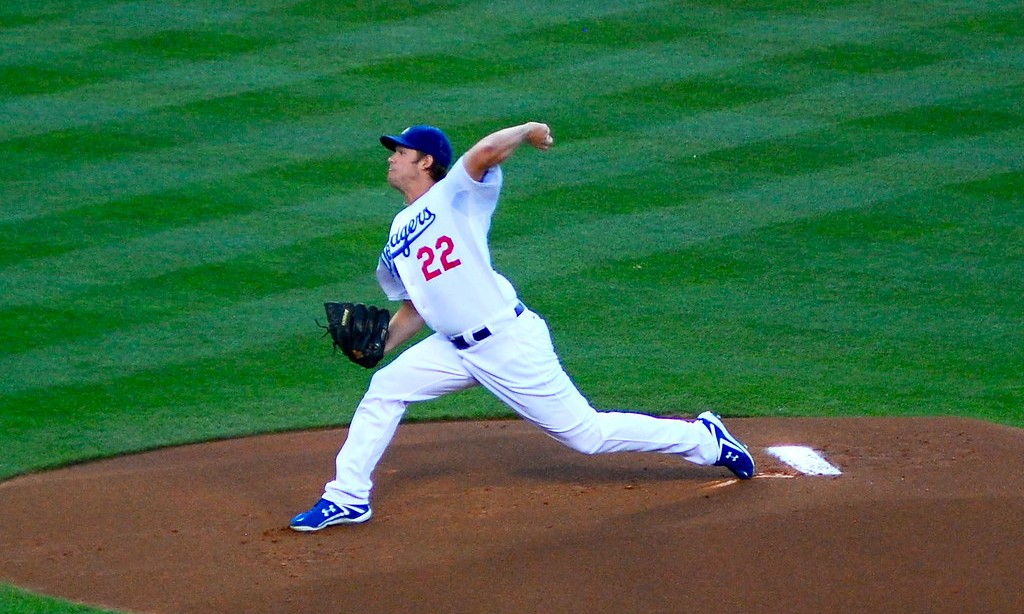It is something that we have all heard many, many times. The “Clayton Kershaw chokes in the playoffs” narrative has permeated the baseball world, and has reached meme status for the past several seasons. It has been a constant idea for so long that it seems to be widely accepted as truth. But is it?
When looking at Kershaw’s postseason career, certain stats jump out at you, and not in a good way. He has a career ERA of 2.43 in the regular season, but that rises to 4.22 in the postseason (including Game 1 of the World Series last night). He has had numerous rough outings in several big games for the Dodgers, dating all the way back to the 2009 postseason. But despite the glaring surface-level numbers, things may not be as bad as they seem for postseason Kershaw.
With Very, Very Little Help From My Friends
Part of the reason the Dodgers have been consistently one of the best teams in the majors for years is their pitching. Of course, starters like Kershaw and the young ace Walker Buehler are huge factors, but the Los Angeles bullpen has played a big role in their success as well. Over the past five seasons (since 2016), the Dodgers’ bullpen has allowed just 29% of inherited runners to score.
However, when Kershaw is on the mound, the story changes. In that same period of time, LA’s bullpen has allowed every single one of Kershaw’s inherited runners to score in the postseason. Over 23 playoff appearances (19 starts) since 2016, Kershaw has left 11 runners on base, and the bullpen allowed all 11 of them to score. Since his playoff debut in 2008, the Dodgers’ bullpen has allowed 70% of inherited Kershaw runners to score.
How much different would that postseason ERA look if the bullpen had instead allowed inherited runners to score at the same rate they normally do? Well, let’s find out.
Since 2008, the LA bullpen has allowed 16 of 23 inherited Kershaw runners to come around and score. That gives us the previously mentioned 70%. If they had allowed only 29% (their overall rate since 2016) of those 23 runners to score, the bullpen would have allowed only 7 runs (rounding up). Take the other nine runs off of Kershaw’s postseason total, and his ERA lowers from 4.22 to 3.78. Still not nearly the level of regular-season Kershaw, but a very respectable ERA, and comparable to postseason ERAs of pitchers such as Roger Clemens.
Cheated Out of a Good Reputation?
One of Kershaw’s notorious bad playoff outings came in Game 5 of the 2017 World Series. He allowed 6 runs in just 4.2 innings, and the Dodgers lost 13-12 to fall behind 3-2 in the series. However, this game was at Minute Maid Park, against the Houston Astros, who we now know were engaging in an egregious sign-stealing scheme throughout the year. In that Game 5, Kershaw threw a total of 51 breaking balls to Astro hitters. He did not generate a single swing and miss on these pitches.
At the time, this game was one of the most prominent examples of Kershaw ‘choking’ in the playoffs. But with the Houston batters able to acknowledge every pitch coming out of Kershaw’s hand before it actually did, it wouldn’t be particularly fair to hold this game against him.
Unfairly Maligned
To be clear, it is still evident that Kershaw has not been as good in the postseason as he has been throughout the regular season in his career. However, if the Dodger bullpen had allowed inherited Kershaw runners to score at an average rate, and he didn’t face the Astros during the height of their cheating scheme, he would currently possess a 3.58 career postseason ERA. That’s better than the postseason ERAs of numerous Hall of Famers, including Randy Johnson and Greg Maddux.
This is not meant as an excuse for Kershaw, because certainly some of the fault can be placed on him if one should so choose. You can argue that he should simply allow less runners to reach base, or that other pitchers didn’t necessarily struggle as heavily when facing the Astros that postseason. But, at the end of the day, these are both circumstances that are out of Kershaw’s control, and yet they have both played a direct role in the narrative of his postseason struggles.
The Clayton Kershaw Revenge Tour
Kershaw was dominant in Game 1 of the World Series on Tuesday night. Across 6 innings, he allowed just one run on two hits, with eight strikeouts to just a single walk. With only 78 pitches, he was slated to return for the 7th until the Dodgers blew the game open, taking an 8-1 lead in the bottom of the 6th.
‘Kersh’ has been on a tear this postseason, striking out batters at a higher rate than he ever has in October. He has a 2.88 ERA in 4 starts during the 2020 playoffs, with 31 strikeouts and just three walks.
Kershaw is the best pitcher of this generation, with or without the playoff issues. Already a Hall of Famer and arguably one of the best pitchers of all time (certainly one of the most skilled), Clayton Kershaw has been unfairly maligned throughout his career due to the aforementioned issues, but a World Series win in 2020 could all but erase that talk.




